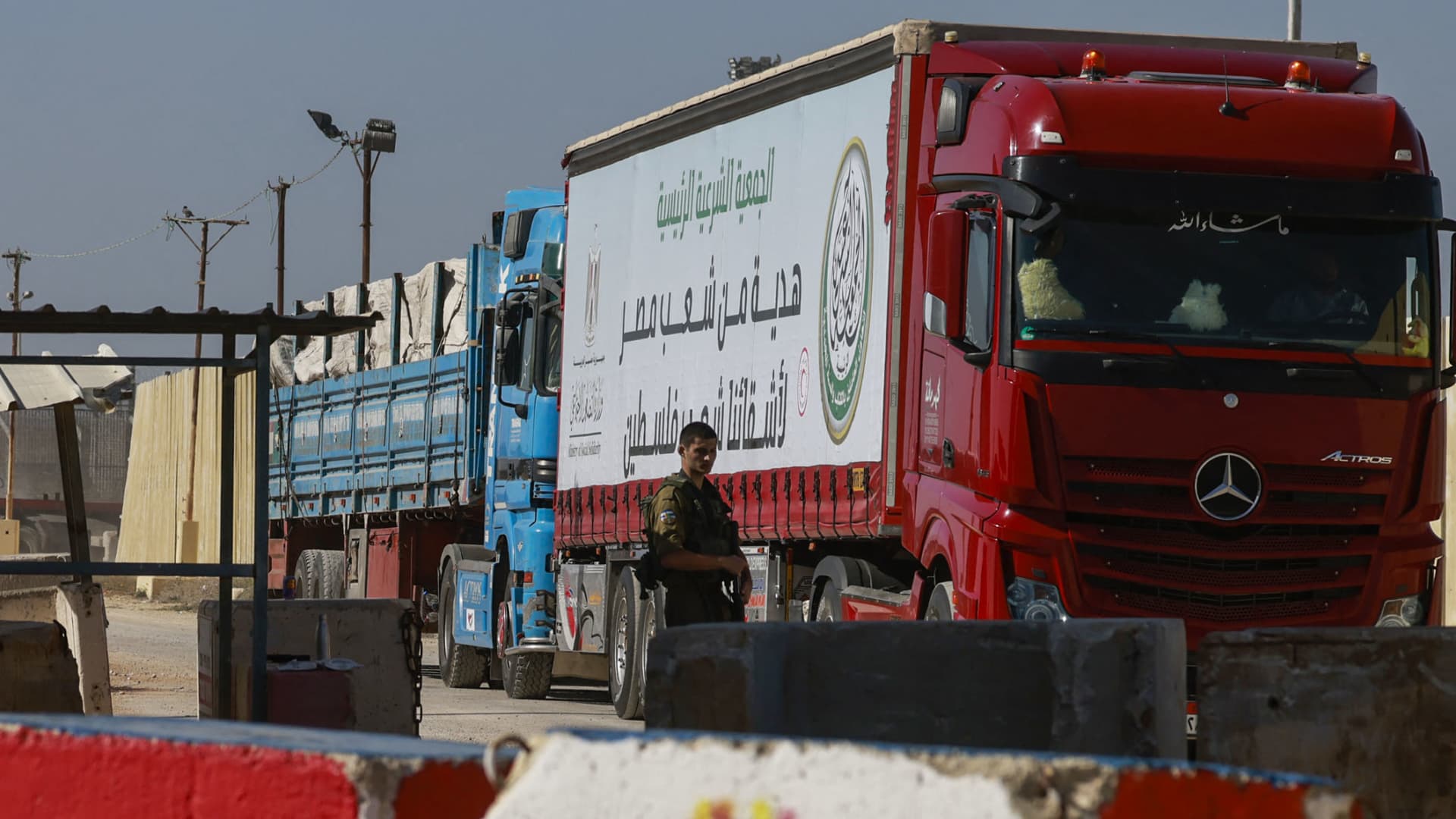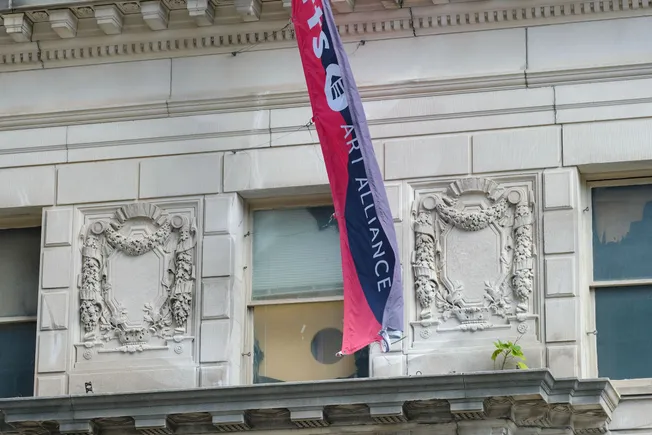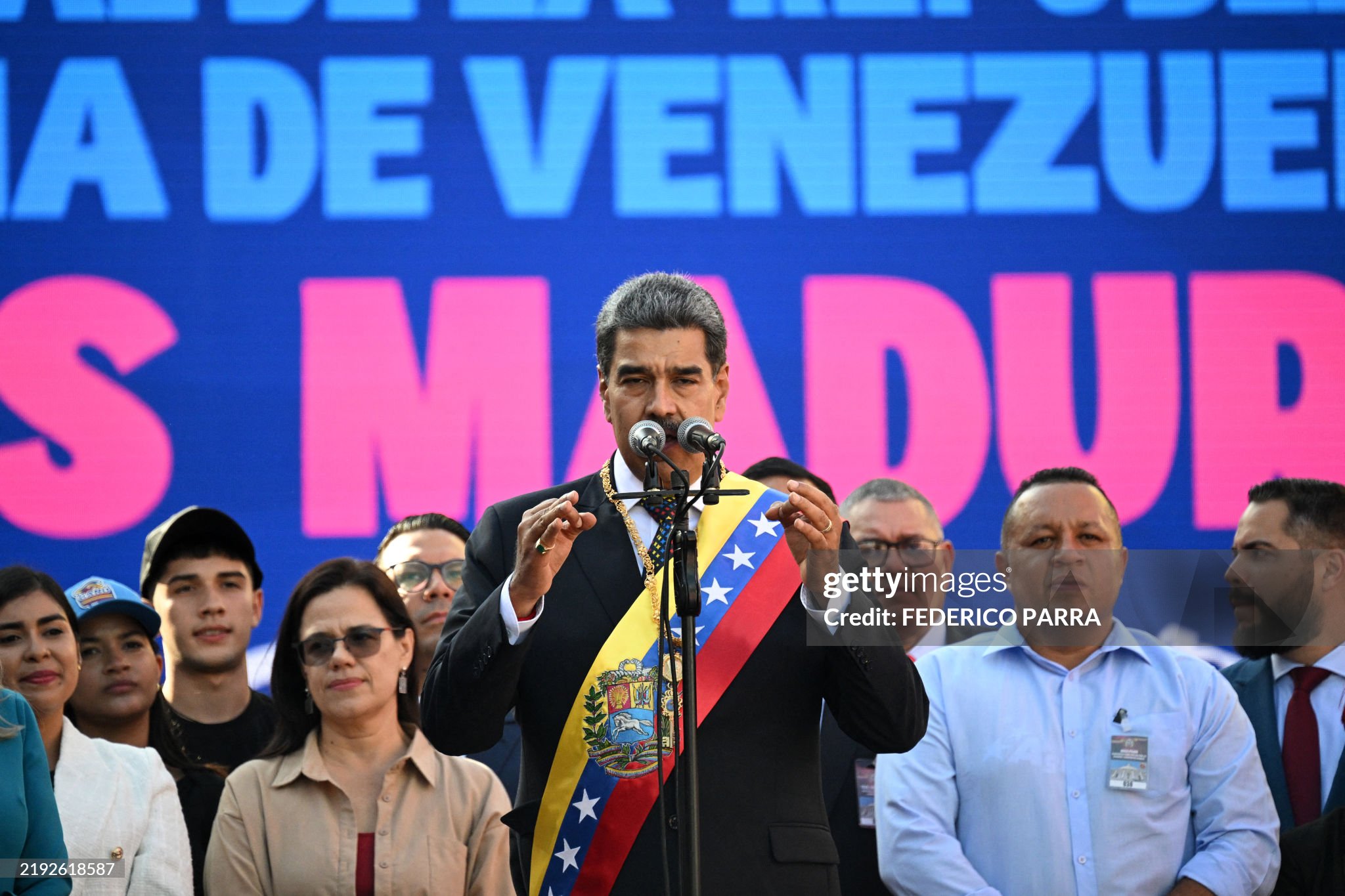An Israeli soldier stands by an Egyptian truck carrying humanitarian aid at the Israeli side of the Kerem Shalom border crossing with the southern Gaza Strip on January 22, 2024, amid the ongoing conflict between Israel and the Palestinian militant group Hamas.
Menahem Kahana | AFP | Getty Images
Hundreds of trucks loaded with food and medical aid sat idle on the roads heading into Gaza recently as a senior humanitarian official accused the Israeli government of blocking lifesaving supplies from reaching the devastated enclave.
“They limit the number of trucks that can pass,” Mohamed Nossair, head of operations at the Egyptian Red Crescent, said of Israeli officials and soldiers charged with inspecting aid destined for Gaza. “The problem is also they reject these items … that are very essential.”
Oxygen canisters, water filters, metal forks, over-the-counter painkillers and generators were among the items that Nossair said had prevented trucks from entering Gaza, where a vast majority of the people are displaced and more than 32,000 have been killed, according to local health officials.
“If I have a truck with rejected items, they reject all the truck,” Nossair said during an interview with NBC News.
On Thursday, the United Nations’ highest court reinforced Nossair’s statements, ordering Israel to open more land crossings to allow food, water, fuel and other supplies into Gaza.
Israeli officials have been imposing an opaque and cumbersome process and worsening the dire humanitarian crisis in the strip, Nossair and other aid officials charge. These accusations, which come amid warnings of an “imminent” famine inside Gaza, have brought increased criticism of Israel’s government and triggered a blame game with aid agencies.
Israeli officials have repeatedly denied obstructing aid from entering Gaza, and instead blame the U.N. for acute shortages of lifesaving supplies in the strip — particularly the north.
Members of an NBC News team in Rafah saw hundreds of vehicles on the road, as well as some in a parking area and more at a tunnel crossing in Ismailia, roughly four hours and 125 miles from the border crossing. Satellite images from the last week also show trucks on the road and parked near the crossing.
According to Nossair, at the time, roughly 100 to 120 trucks enter Gaza per day — about half the number able to be processed by Israel, and a fraction of prewar levels. (Aid agencies and the U.N. say Gaza needs between 500 and 600 trucks a day carrying both humanitarian aid and commercial goods.)
Unclear restrictions imposed by Israel have resulted in an average of 20 to 25 trucks turned away every day, about a fifth of the number that end up crossing into Gaza, he said.
Supplies taken in wooden crates are rejected outright regardless of what is inside, Nossair said. If pallets of aid don’t fit the exact dimensions approved by the Israeli government, he says, those trucks are also rejected.
The Israeli government agency responsible for allowing aid into Gaza, Coordination of Government Activities in the Territories, or COGAT, told NBC News that 99% of the aid trucks are approved after being screened.
COGAT has said it places “no limit” on the amount of aid entering Gaza but subjects some items to higher security scrutiny.
“The State of Israel will continue facilitating humanitarian solutions for the Gaza Strip, however, it has no intention to compromise in any way when it comes to its citizens’ security,” the department said in a statement to NBC News.
A recent NBC News request for permission to travel to the Kerem Shalom border crossing to report on this story has been refused by Israeli officials. Both Kerem Shalom and Rafah in Egypt are restricted areas that require permission to access.
Israeli officials have also blamed the U.N.’s Palestinian refugee agency (UNRWA) for a failure to distribute aid. According to COGAT, UNRWA has not requested convoys north for six weeks.
A representative for UNRWA did not respond to a request for comment on the allegation.
UNRWA, meanwhile, also accuses Israel of obstructing aid efforts by rejecting convoys and turning away trucks for carrying items such as scissors included in medical kits.
Israeli accusations that at least a dozen UNRWA staffers took part in the Oct 7. Hamas terror attack prompted key donors to pull funding from the group and triggered a raging debate about the limited evidence Israel has produced.
The problem with freezers
Sometimes the issue is not the item itself, but what it is stored in, Nossair said.
For example, he said, Israeli officials have turned back insulin because it is kept in freezers.
COGAT has a list of what it considers “dual-use” items that are subject to stricter scrutiny, which mostly include chemical products, cement, metal and construction items. The list does not include coolers, painkillers, anesthetics or medical equipment, yet Nossair said everything from anesthesia to paracetamol is rejected.
Dual-use items are not under a blanket prohibition, COGAT said.
“They are subjected to security screening, since the Hamas terrorist organization cynically uses these means for the advancement of its terrorist objectives,” COGAT said in a statement when asked why certain items, and thus whole truckloads of aid, were sometimes denied entry and sometimes not.
Distribution of aid within Gaza is also a struggle, particularly in the northern area of the strip, where aid has been inconsistent. The World Food Programme has described convoy journeys to the north as dangerous due to desperate crowds and checkpoint delays that often leave teams open to violence. And even when convoys do make it to the area, they can be denied access by the Israeli military.
UNRWA Commissioner-General Philippe Lazzarini said Sunday that Israel will no longer approve the agency’s convoys to travel to the northern area of Gaza.
“This is outrageous & makes it intentional to obstruct lifesaving assistance during a man made famine,” Lazzarini said in a post on X. “These restrictions must be lifted.”
COGAT responded to Lazzarini on social media, saying Israel facilitated more than 350 trucks of aid to northern Gaza in the last month. It also invoked Israel’s allegations that UNRWA workers had ties to terrorism.
The Integrated Food Security Phase Classification initiative, or IPC, released a report earlier this month warning that “famine is imminent,” particularly in northern Gaza, where the first deaths due to malnutrition were reported last month. COGAT wrote in a thread on X that the information used by the IPC was outdated and that aid has significantly improved in recent weeks.
Nevertheless, the World Health Organization warned earlier this month that children were dying from the combined effects of malnutrition and disease and that Gazans will face long-term health ramifications.
“This compromises the health and well-being of an entire future generation,” the WHO said in a statement following the IPC report.
Tedros Adhanom Ghebreyesus, the WHO’s director-general, warned that famine is looming amid the bombardment of Gaza even after increased efforts to deliver aid.
“Starvation and illness continue ravaging the population,” Tedros said on X. “Immediate, concerted action is needed now.”
Secretary of State Antony Blinken met with Arab leaders in Cairo last week, where he said the group of diplomats agreed more needs to be done to ensure the surge of aid from recent weeks is sustained over time and that “Israel needs to do more.”





















Discussion about this post